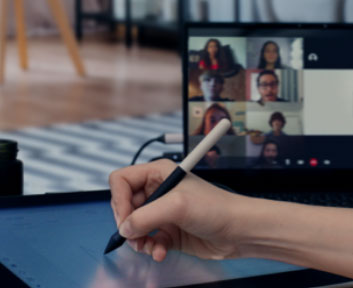
Initiatives in China – Bringing Digital Ink Technology to More People
WILL (Wacom Ink Layer Language) is a Software Developer's Kit (SDK) for digital ink technology that allows users to freely share and utilize handwritten ink data without worrying about hardware or software compatibility. The Ink Division is a team dedicated to increasing awareness and spreading the use of WILL. Lannie Zhang, the only product manager in the Ink Division in China talks about how the Ink Division is Wacom's innovation center for software and so much more. We spoke with Lannie about the team’s efforts in China since this division was established in 2018, her goals for the future, and how she plans to continue taking on new challenges in an ever-changing environment.
Could you tell us about your responsibilities in the Ink Division?
Lannie: As a Senior Product Manager in the Ink Division, I am responsible for China and the Asia Pacific area. The Ink Division is an independent department within the company, which supports other business units and has the task of finding ways to add value to our products. Personally, I think our division is Wacom's innovation center where new ideas and technologies around ink are born. We have developers on the team, but we are mostly interested in being creative and innovative ourselves. The entire team works with the mindset that we are creating the Wacom of tomorrow.
Can you tell us about some initiatives happening in the Ink Division?
Lannie: One global initiative I was involved in is a joint project between Montblanc and Wacom. Montblanc is a founding member of the Digital Stationery Consortium (DSC*). They launched Augmented Paper to combine the writing feeling of a Montblanc writing instrument together with the benefits of digital. I was very happy to collaborate with Montblanc, to be a part of this project together with TSBU colleagues, and make it all happen.
*A non-profit organization initiated by Wacom in 2016 to promote the spread and market development of digital stationery.
What kind of initiatives are you working on in China?
Lannie: We are working on various tasks to increase awareness of WILL (Wacom Ink Layer Language*) in China. In the past few years, we have mostly been focusing on supporting education. At the end of 2020, the WILL SDK was adopted for the Roombox Whiteboard by the New Oriental Education & Technology Group Inc.
Roombox Whiteboard makes it possible to write on a whiteboard while it’s being used in their online learning platform, New Oriental Cloud Classroom (Roombox). Roombox is one of the largest online learning platforms in China, with over four million users to date. We are very happy that WILL is being used on a daily basis and that we are contributing to the learning platform’s value.
*WILL is a technology that allows users to freely share and utilize their handwritten ink data (digital ink) across computer operating systems (OS), hardware platforms, application software, etc., without worrying about compatibility. Wacom provides SDK (Software Developer's Kit) to enable WILL to be used in a wide range of fields.
“How to help optimize handwriting and stabilize output” from Connected Ink 2021.
What challenges do you think are necessary to increase awareness and make WILL more popular in China?
Lannie: I believe that the Ink Division’s mission is to convey to customers that Wacom is a company that can provide not only hardware but also solutions including hardware, software, and related services. To achieve this, it’s necessary to cooperate with our team members who are customer facing. Getting team members to understand WILL's technology is another challenge, but also one of the things I find really interesting. It’s not easy, especially for team members who have been involved in hardware for many years, because it starts with understanding basic terminology such as WILL SDK, for example. We took the time to explain it to them, and I think they now know that our ink technology is what differentiates us from our competitors.
Wacom wants to provide unique experiences, not just tools, and our products are a gateway to that. We want our customers, both businesses and individuals, to become familiar with Wacom's technologies. That’s why we need to nurture the market so that people understand the value of our technology and products.
You are also involved in activities such as Connected Ink, the Inkathon, and the Digital Stationery Consortium. Could you tell us a little more about that?
Lannie: I am the only product manager in the Ink Division in China, so I am involved in various activities to build partnerships in the country.
The Inkathon (*1), Connected Ink(*2), and the DSC are all global events held by Wacom. We thought that localizing them to China would allow us to meet more engineers and partners in the country. DSC, for example, now has a WeChat service account that allows communication in Chinese, which helps us promote more interaction while creating an environment that makes it easier for domestic partners to participate. In addition, Connected Ink is working with domestic partners to introduce technologies for the future and inform them about all the possibilities of new solutions.
*1: A development contest organized by Wacom since 2016 for apps featuring an ink function.
*2: An event organized by Wacom since 2016 for the purpose of exploring new directions in art, human expression, learning, and the technology that supports them. Each year has a new theme and question that is posed to the participants.
Since joining the company in 2011, has there been a particular initiative that stands out in your mind during your 10+ years at Wacom?
Lannie: It’s not directly related to my work, but I volunteer at my local library to read books to children. One time I used a Wacom Bamboo Smartpad* to write down the contents of one of the books we were reading. I tried to get the children's attention, but they were too fascinated by the words I wrote on paper using the Bamboo Smartpad since it was being digitized on the tablet in real time. They said, "It's like magic!” Their parents were also interested in the process and asked how to go from analog to digital handwriting. I was really proud that our technology and our products are able to create such magical moments.
*Wacom Bamboo Smartpad is a notepad that allows you to digitize text and pictures written on paper by using a special pen. This product is bridging the analog and digital worlds since ink can be physical as well as digital.
As a member of the Innovation Center, what is your secret to staying innovative?
Lannie: I like challenges. I would rather try something new than do the same thing every day. I enjoy the opportunity to see the surprises that await me once I complete a challenge. It’s not easy to explain digital ink technology or to help customers understand it. I myself am learning every day. But sharing what I learn with my colleagues and customers is what makes me proud of what we are doing and I believe that this is what it means to work at Wacom. Every time I talk to my colleagues or our partners, new ideas bubble up which, by nature, sparks new opportunities and drives us to move forward.
Do you have any goals or dreams that you would like to make happen in the future?
Lannie: I would like Wacom to be a symbol for creation, to be recognized not only as a hardware company, but as a company that can provide solutions beyond the use of tools. It may be a lofty dream, but I believe we can achieve it. And I would be happy if more people could see the value of digital ink. I’m working on some communication initiatives that will help people better understand digital ink technology and hopefully get them interested in exploring this topic together. We also have some ideas that haven’t been introduced to the market yet. We’re currently in the process of fine-tuning them to figure out how they could be useful for people and society at large. I hope to meet many more customers while I continue facing the challenges that come with bringing new products and technologies out into the world.

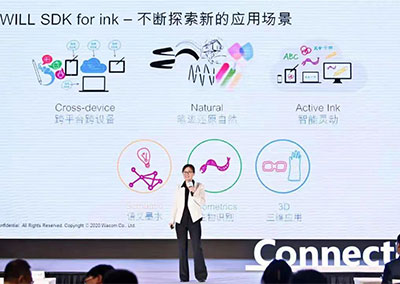
.

Reflecting on the Last Five Years: Progress and Future Trajectories of Social Initiatives
We will reflect upon our five-year journey with CEO Nobu Ide about the intention to connect the future of Social Initiatives with our Meaningful Growth.

Our Sparks. “Focus: The Autistic Superhero Loves Comic Art!” by Yvonne Wan
Discover the inspiring works of community creators who collaborate with us. Today, we feature “Focus: The Autistic Superhero Loves Comic Art!” by Yvonne Wan.

Back to the Forest/Connected Ink 2023
The theme of Connected Ink 2023 was 'Back to the Forest.' Together with our community, we shared our memories of returning to the forest of Creative Chaos.

"CREATE Program" Expanding Future Possibilities and Connecting Hopes
Wacom Canada has been involved with the "CREATE Program" at Sisler High School as a partner to support students who want to embark on career paths in the creative industry.

Our Sparks. “Join The Journey” by Arian Rahmatzai
The 'Our Sparks.' pages showcases community creators whose works inspire and collaborate with us. This time features Arian Rahmatzai's artwork, a German talent who interned at Wacom.
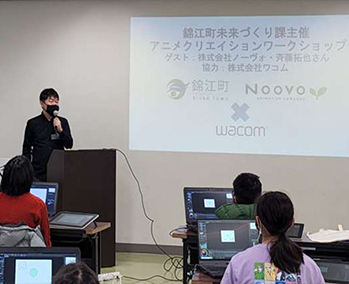
Supporting Children's Dreams of Becoming Creators - 1: Initiatives with Kinko Town
The aspiration of children who dream of becoming creators is what ignites our team members’ enthusiasm and drives many of our initiatives. One such initiative involved teaming up with an animation workshop in Kinko Town, Kagoshima Prefecture, Japan.
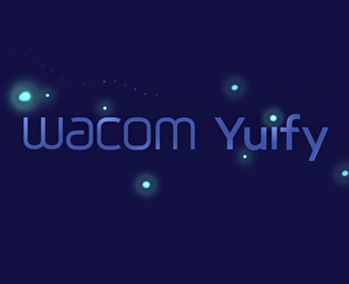
Wacom Yuify: Making the world a safer place for creators
Wacom Yuify is an innovative service being developed to authenticate creators' works by embedding invisible micro-marks into artworks and, therefore, addressing unique needs across various regions and cultures.
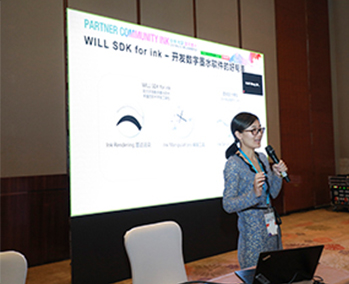
Initiatives in China – Bringing Digital Ink Technology to More People
Lannie Zhang, the only product manager in the Ink Division in China, took the time to talk to us about the initiatives planned to increase awareness and promote the use of digital ink technology.

Our Sparks. “At the beach in the early afternoon” by sammy
We would like to introduce the artworks by artists in Oiso Town, Kanagawa, Japan, where we have been working together to support the writing/drawing initiative.
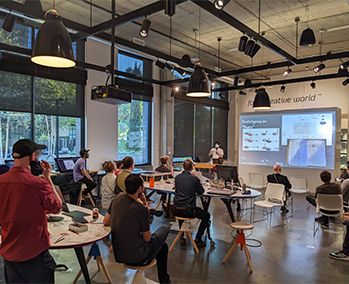
Wacom Experience Center - A space for everyone to be creative
The Wacom Experience Center Portland was created for people to interact with the creative community in the city. We took a look back at its growth with Megan Davis, who has been playing an energetic role there.

Connected Ink 2022: What happens here is everything
Connected Ink 2022 opened with two key questions. Let’s take a look back at some of the sessions in Tokyo that explored them.
Read More
Our Sparks. “Wind Carrying Light” by Syuro
We would like to introduce the artworks by artists in Oiso Town, Kanagawa, Japan, where we have been working together to support the writing/drawing initiative.
Read More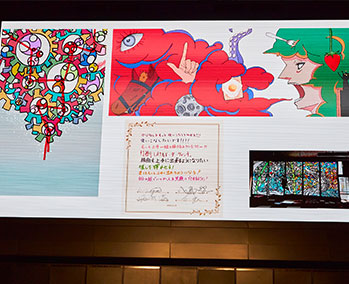
How can we support the “writing/drawing" initiative with Oiso Town?
The partnership with Oiso Town has developed into a city-wide initiative. We spoke with Tadakuni Tsubota of the Creative BU Retail Partnership about this initiative.
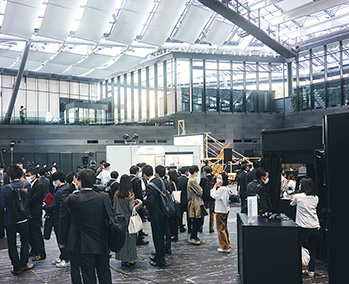
A side of the Connected Ink polyhedron - 2
How do team members see Connected Ink? The next team member is Yohei Himori who is involved in the planning and operation of Connected Ink together with Heidi.

A side of the Connected Ink polyhedron - 1
How do team members see Connected Ink? The first team member is Heidi Wang who has played a key role in the planning and operations when it all began in 2016.

How can we overcome barriers that exist in society? / Call & Response
In collaboration with Heralbony Inc. and the General Incorporated Association, Connected Ink Village, Wacom launched a new initiative called "Call & Response” in September 2021.
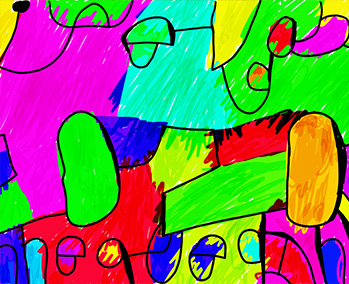
What Lingers in the Afterglow / Connected Ink 2021
Here’s a look back at the opening and finale of the nearly 70 sessions held that day and reflect upon what has happened since Connected Ink 2021.

Our Sparks.
“The spark of love” by Jacky Yang
Our sparks meet constantly changing situations, unexpected challenges, and new opportunities. We called on our team members again to show how they see their spark in the world of today and the future.
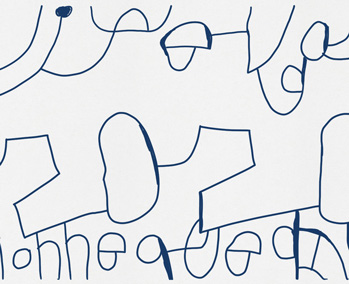
Keep asking questions and moving forward / Connected Ink 2020
Connected Ink 2020 was the beginning of a new commitment and challenge for Wacom to continue asking those eternal questions that always play in our minds.
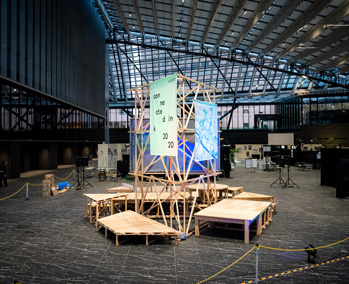
“Stage KOPPA”, a stage that connects stories
"Stage KOPPA" was created as a stage for Connected Ink 2020. It is a stage that changes its shape and role in response to different situations while connecting the various stories that occur there.

Our Sparks.
“Mam and Dad’s Child Interest” by Stella Wang
“Mam and Dad’s Child Interest” by Stella Wang
Our sparks meet constantly changing situations, unexpected challenges, and new opportunities. We called on our team members again to show how they see their spark in the world of today and the future.

Our Sparks.
"A moment on an autumn mountain" by Takahiro Yamamoto
"A moment on an autumn mountain" by Takahiro Yamamoto
We had an internal art contest for our Social Initiatives. Let us share the existence of the spark in our team members’ hearts with their artworks.
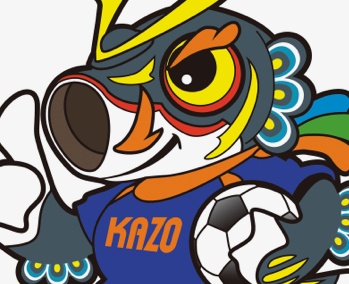
Online drawing class for elementary school students during stay-at-home period
Yoshinori Mita, a team member of Japan held an online drawing class together with FC KAZO and illustrator Suiiro to provide something fun for elementary school children to do during the COVID-19 stay-at-home period.
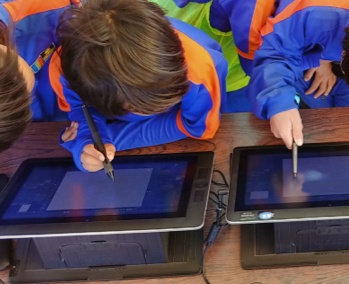
Wacom's new initiative through soccer
As an official partner, Wacom supports FC KAZO, a soccer club in Kazo City, Saitama Prefecture, Japan. We’re excited to introduce our new initiatives with this inspiring club.

Our Sparks.
"The spark is in you! Mirror portraits during times of isolation" by Oliver Madlener
"The spark is in you! Mirror portraits during times of isolation" by Oliver Madlener
We had an internal art contest for our Social Initiatives. Let us share the existence of the spark in our team members’ hearts with their artworks.
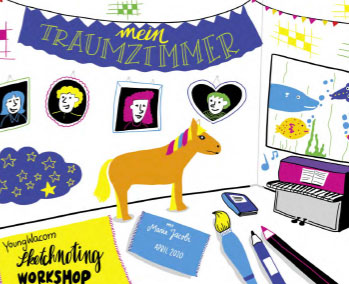
Online Sketchnoting workshop for children during school closures
Our team members in Germany organized an online workshop “Young Wacom” for the children while schools were closed due to the COVID-19 pandemic.
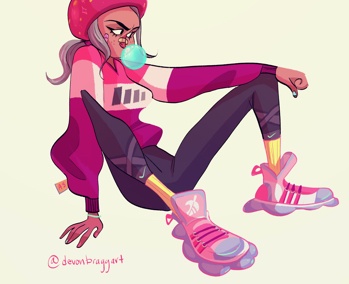
Support the "lives" of artists through customer support
Alex Duffey from our Americas Support team established a new program to support artists. We asked him about a story with Ms. Devon Bragg, the artist who inspired him to establish this program.

3. How KOPPA began /
The story of the Traveling KOPPA
The story of the Traveling KOPPA
KOPPA began in April 2019. Tamotsu wanted to make something that can be used again after an exhibition. We asked Team KOPPA about their thoughts.

2. No need to destroy it anymore /
The story of the Traveling KOPPA
The story of the Traveling KOPPA
We put it together ourselves, set it up, put it back, then travel together again. The Traveling KOPPA, our new display furniture came to be.

1.Meeting KOPPA /
The story of the Traveling KOPPA
The story of the Traveling KOPPA
KOPPA started out as a challenge: Tamotsu Ito, an architect from Japan, wanted to utilize leftover building materials. Our meeting was pure happenstance.

Our Sparks.
“That Spark Inside” by Simone Wolters
“That Spark Inside” by Simone Wolters
We had an internal art contest for our Social Initiatives. Let us share the existence of the spark in our team members’ hearts with their artworks.
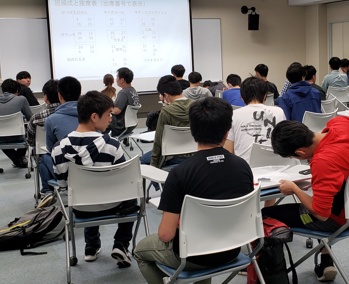
Marketing lecture for future engineers
We gave a marketing lecture for students who are learning to be engineers at the National Institute of Technology Tokyo College.
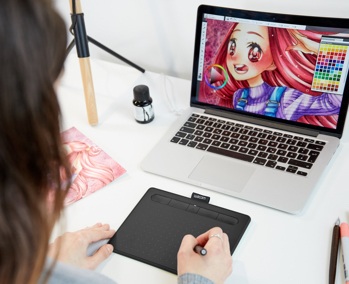
Efforts by our sales member, who are responsible for a pen tablet until the very end
Every year, we take pen tablets that have been sitting in our warehouse and gift them to high school clubs and winners of high school art competitions to help students create digital contents.
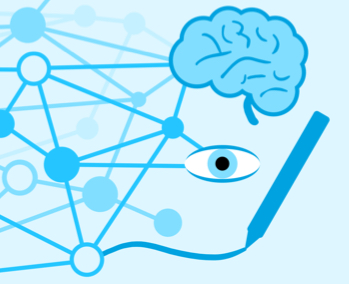
For the Future of Education
Lifelong Ink x AI
Lifelong Ink x AI
"AI Ink for Education" was developed to capture eye movement information and pen movements while learning, in order to ascertain the characteristics of learning by each student and to create an educational environment suited to each student.
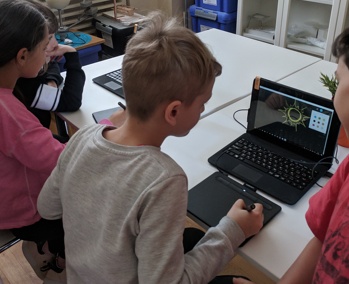
Wacom Intuos have been introduced in a school to make classes more fun and creative
Yoana Simeonova, a software designer working in Bulgaria, introduced Wacom Intuos in a school to make children's IT classes more fun.
サステナビリティに関連した当社の規範、
方針、体制等























